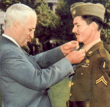How to Love Self and Others By: Tom Russell
We can only understand what this requires if we understand what it means to love ourselves.
The background of the commandment
 The Lord Jesus in Matthew 22:39 identifies the commandment “love your neighbor as you do yourself” as the second greatest in the Law of Moses, the first being, “You shall love the Lord your God with all of your heart, soul, and mind.” Jesus goes on to state that “On these two commandments depends all the Law and the Prophets.” Vs. 40
The Lord Jesus in Matthew 22:39 identifies the commandment “love your neighbor as you do yourself” as the second greatest in the Law of Moses, the first being, “You shall love the Lord your God with all of your heart, soul, and mind.” Jesus goes on to state that “On these two commandments depends all the Law and the Prophets.” Vs. 40
Though it is important to note that the Lord was answering a Jewish lawyer about Jewish law (Deut. 6:5, Lev. 19:18), the universal applicability of these two commandments is necessarily implied in Romans 1:19-22 and Romans 13:8-10. In fact, I believe these laws are written upon our hearts (Romans 2:14-16), in that all capable of moral judgment feel a desperate need to be dealt with fairly and therefore, to be consistent, should treat others fairly. For instance, every man knows it is wrong for someone to steal his property, therefore he knows it is wrong for him to steal the property of another. You see this codified in cultures and civil law around the world throughout history.
So, if love for self is to be the standard for loving others, what is involved in loving self?
We might equate “love ourselves” with selfishness, but we would be mistaken as it is the opposite of destructive selfishness. The word “love” in our text is the Greek word “agape” which we might define as responsibly pursuing that which is best for self, or another. If we agape self, we pursue that which is truly good for us and sacrifice selfish desire which is, in the end, always morally, physically, and socially destructive. Therefore, loving self is appropriate and responsible, and is to be the standard for how we treat others.
The relationship between law and love can be seen in our own experience. As we progress through life we learn rather quickly that others should keep their word and treat us fairly; we then begin to realize it is only fair that we treat others the same way. Paul, in Romans 13:8-10, reveals that it is love that prevents us from unjustly harming another when he said, “Owe no one anything, except to love each other, for the one who loves another has fulfilled the law. The commandments, “You shall not commit adultery, You shall not murder, You shall not steal, You shall not covet,” and any other commandment, are summed up in this word: “You shall love your neighbor as yourself.” Love does no wrong to a neighbor; therefore, love is the fulfilling of the law.” The purpose of law is to govern our relationship with God and man, and we now begin to see that love for God and oneself enforces all good law.
 During the Battle of Okinawa, at the close of WWII, a young Army medic, Desmond Doss, saved the lives of fifty to one hundred wounded soldiers on a war-torn escarpment called Hacksaw Ridge. Though wounded himself, Doss spent thirteen hours pulling the wounded to the edge of the escarpment and lowering them on ropes to awaiting soldiers below, who then transported the wounded to an aid station.
During the Battle of Okinawa, at the close of WWII, a young Army medic, Desmond Doss, saved the lives of fifty to one hundred wounded soldiers on a war-torn escarpment called Hacksaw Ridge. Though wounded himself, Doss spent thirteen hours pulling the wounded to the edge of the escarpment and lowering them on ropes to awaiting soldiers below, who then transported the wounded to an aid station.
“Greater love has no one than this, that someone lays down his life for his friends.” John 15:13
Doss on Hacksaw Ridge
 For saving the lives of so many others at the risk of his own,Doss was awarded the Congressional Medal of Honor by Congress on October 12, 1945. After placing the medal around Doss’ neck, President Truman shook Doss’ hand and held it the entire time the citation was being read and then said, “You really deserve this. I consider this a greater honor than being President.”
For saving the lives of so many others at the risk of his own,Doss was awarded the Congressional Medal of Honor by Congress on October 12, 1945. After placing the medal around Doss’ neck, President Truman shook Doss’ hand and held it the entire time the citation was being read and then said, “You really deserve this. I consider this a greater honor than being President.”

When the selfish learn to truly love self and others
A man finds himself dead on the mountain of sin and consequence. He’s so cold and desperately alone amidst the wails of the hopeless and the lost. With a conscience scarcely alive, he whispers “Please save me!” The Father of all men heard and sent His Son, and the Son gave His blood on the mountain and called out to the dead. The man who was dead listened, believed, loved, came to life and walked down the mountain. He climbs the mountain, again and again, to whisper the good news to the dead and the dying, and when life returns, he takes them up and helps them down to the land of the living.
He is a good man, and loves others as himself.